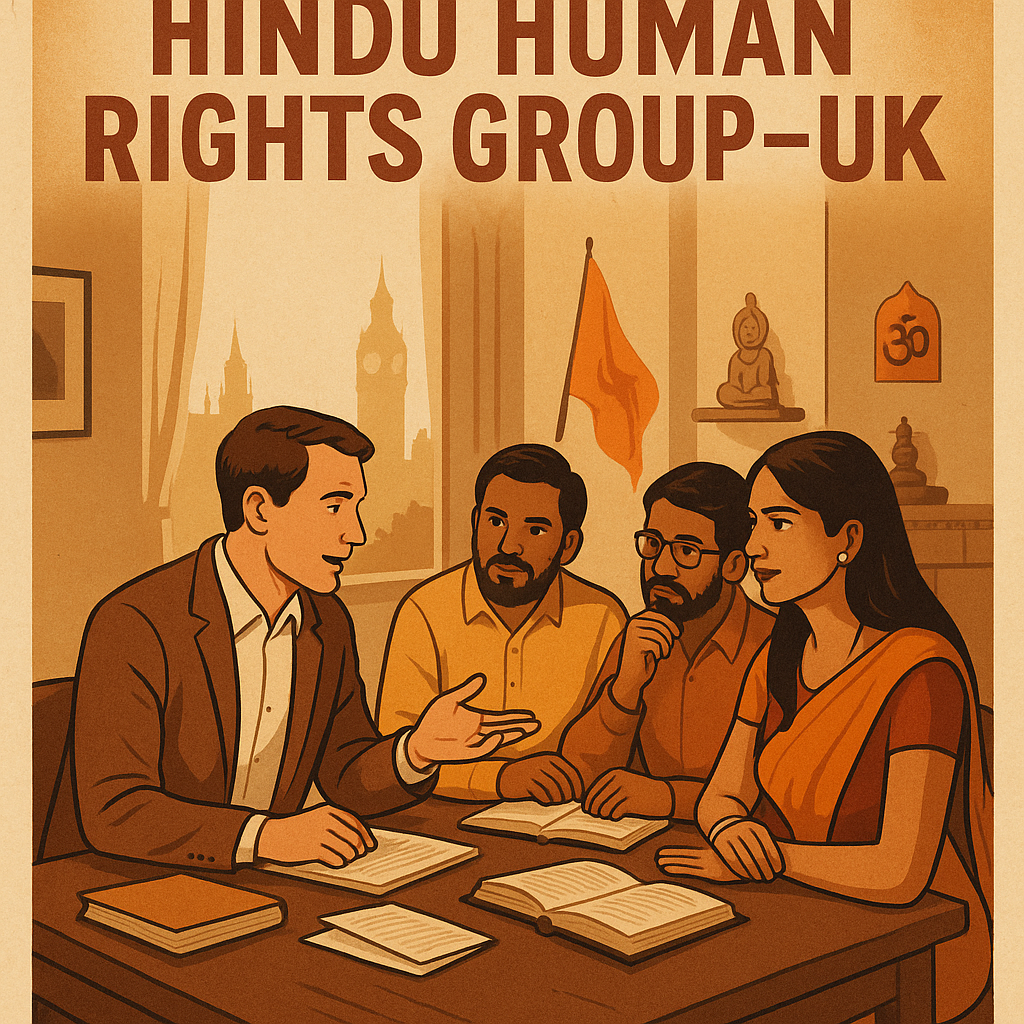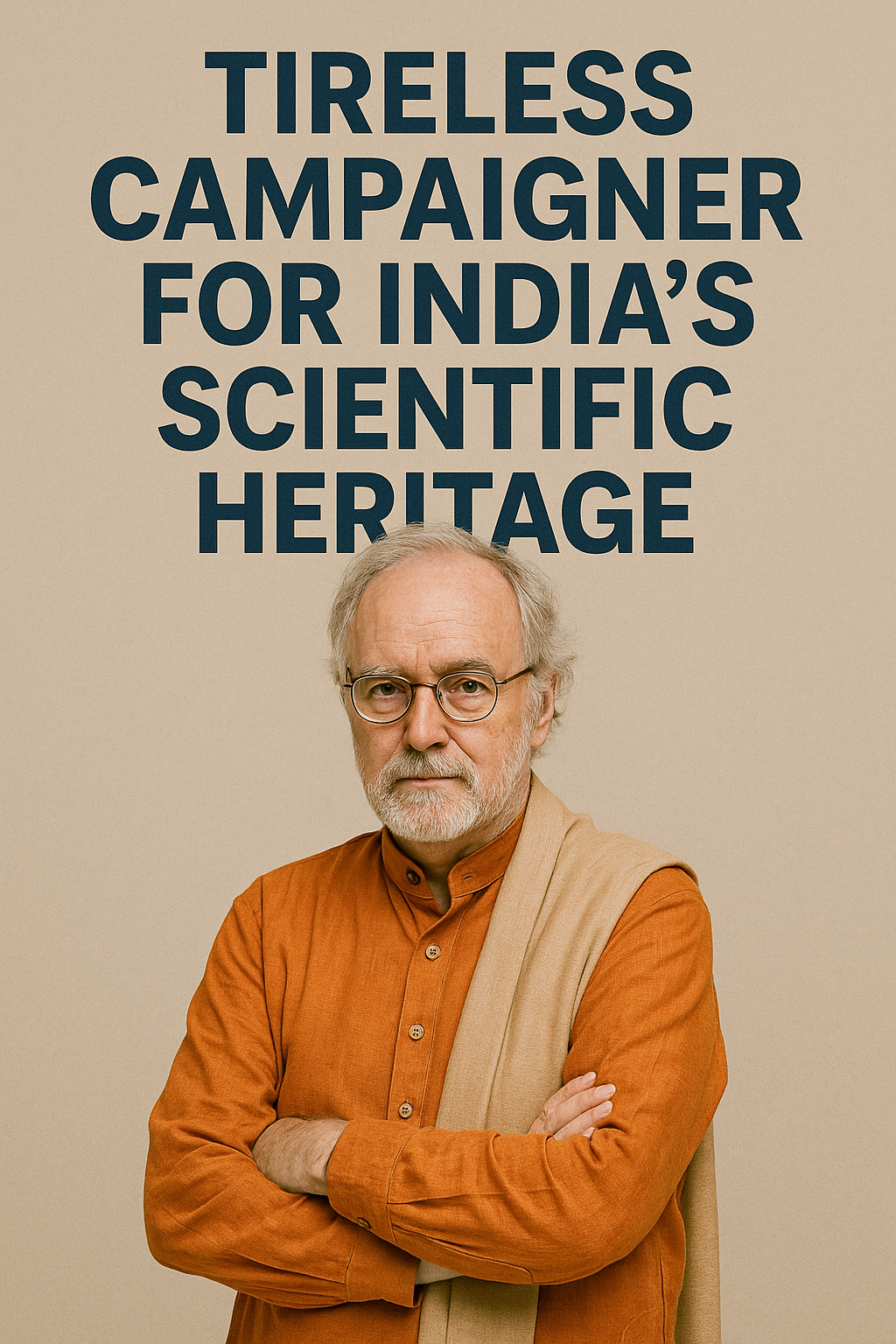‘Human Rights’ has always been a useful stick to browbeat opponents in the global political arena. How honest and balanced are the self-proclaimed human rights ‘watchdogs’? Organizations like Amnesty International give wide coverage to rights violations of many ethnic groups and communities but maintain a strange silence when it comes to Hindus. Whether it be the deliberate killings of Hindus in Kashmir or the planned depredations in Bangladesh or the subtle discrimination and manipulations in countries like Malaysia or Fiji, these organizations at best present a muted response.
Therefore, thinking Hindus have developed a sort of cynicism and general distrust towards them. Recently, when many well-known news portals across the world quoted “the Hindu Human Rights group, based in the UK,” I was pleasantly surprised. BBC even offered a link to the ‘Hindu Human Rights’ website (http://www.hinduhumanrights.org). A quick look at it tugged at my heart – after years of anguish, is global Hindu Renaissance heralding a new beginning here too? I thought I should meet them up.
On a quiet English Sunday, I arrived at one of their meeting places at London. I was welcomed in. There was quiet activity, some members discussing seriously, while others pored over books. Some were planning to leave but stayed back to speak to me. A hush set in as I introduced myself, with some apprehension, perhaps shared by many Hindus towards English language journalists today. But as the meeting progressed, our conversation shifted to a smooth track.
What follows is the gist of the interview with Anil, Nitin, Raju, and Sheila – founding members of the Hindu Human Rights group (HHR), UK. Sheila Maharaj is HHR’s spokesperson.
Sheila Maharaj, spokesperson of HHR
Prabhu Rajagopal: Can you tell us something about the origins of your group?
HHR-UK: (after a short pause) It was a long process. Growing up in mixed communities in London made many of us acutely aware of and question our identity. Over the years, we were painfully exposed to the numerous problems facing Hindus. So many times, it was frustrating for us, as Hindus, to see why we alone put up such a spineless response to the different challenges and provocations. But deep within, we knew, that in spite of all this apparent weakness, Hinduism could not be all that shallow.
That this great religion survives today and still provides anchor to millions worldwide, when all its contemporaries have been confined to museums, and is as vibrant as it was over millennia, would not be possible without an underlying strength. The wonderful magazine Hinduism Today affirmed what we felt. Books by brilliant authors like David Frawley and Sita Ram Goel stirred us. There was this great churning going on and some of us decided that we had had enough of complaining; that it was time to act, to do something, to put into practise what Sri Krishna taught, that ‘we had to go for it now.’
PR: When was this and how did you all meet?
HHR-UK: Things began roughly in around 2001… (with a ring of deep sincerity) When the mind and heart are true to what you want, people turn out. That’s how we all met.
PR: Why this unconventional name?
HHR-UK: All around the world, there are pressure groups lobbying for the rights of particular communities. They have people in the media, academia and the political parties. So much so that some of them even get away with blatant acts and plain blackmail and still, there are people who want to cuddle up to them and ‘respect their sensibilities.’ In this atmosphere, Hindus seem like orphans. Their rights ‘don’t concern nobody’ and they die most often unsung and unwept. No groups, no lobbies represent them effectively, leave alone speak for them. Aren’t Hindus human beings? Also, are they not entitled to Human Rights? That question brought us to this title. But actually titles are nothing, we are essentially a group of concerned people and ‘Hindu Human Rights’ is one of our activities.
PR: Please tell us about some of your activities
HHR-UK: Our activities are mainly aimed at promoting a better understanding of Hinduism and Hindu issues especially rights abuses and circumstances leading to them, both among Hindus and the world at large. We have so far sought to do this through different activities, like promoting awareness through incisive books, organizing talks open to the general public and also at Universities, setting up channels for spreading of ideas like websites etc.
We take efforts to present an unbiased perspective of Hinduism and reach out to similarly marginalized groups like the neo-pagans in Europe and the natives in Africa and America. We have also, till date, organized a number of protests, like the ones against Taliban in July 2001 (at 10 Downing Street); against biased articles during the post-Godhra period in The Independent newspaper; and against the abuse of Hindu minorities in Bangladesh in the aftermath of elections there, in 2003. Recently, we launched a petition against the casting in Shakti, one of Ismail Merchant’s forthcoming films, given that Hindus revere Shakti and considering the lead star’s image. This gained wide coverage in about a dozen newspapers and news portals around the globe, including the Washington Post and the BBC; we were interviewed on BBC Radio 4 in this regard. We believe such coverage is helpful because at least people would awaken to the fact that Hindus do have views on different issues and that the world cannot just continue taking them for granted without any consultation or dialogue.
PR: What in your opinion are the challenges before the Hindus today in the UK?
HHR-UK: There are both internal and external challenges. One important external issue is the need for Hindus to be classified as Hindus and not in such confusing terms as ‘Asians’. You know that a few years ago there were race riots in the North of UK. What many do not know however is that Hindus were attacked as much as the whites; but the local newspapers ran campaigns for freeing those very ‘Asians’ who’d butchered Hindus.
Then there is the problem of periodic attacks on Hindu temples, dating from the Ayodhya days. Added to this is the portrayal of Hinduism in the print and electronic media, which creates an intellectual atmosphere for the abuse of Hindus – ‘they deserve it’ kind of attitude. Unsympathetic, disparaging and outlandish comments often bordering on mockery are made upon Hindu Gods and Goddesses and Hindu rituals.
There is also a disturbing trend in so many popular soap operas, which show Hindu families as dysfunctional and Hindu women as being loose. This makes us suspect if there is an attempt to influence Hindus in a certain way, because, in reality, Hindus in the UK have been known to have the strongest family values. And then we have the problem of missionary propaganda and conversion of Hindus to other faiths. Hindus can be easy prey because they do not often know much of their own tradition and all that they see and hear only adds to negativity regarding Hinduism. Internally, a serious problem is the unreasonable dominance of regional and sectarian bodies over religious and social life of Hindus. The consequent lack of cohesion aggravates all the problems and hinders any collective response.
PR: What do you think is the cause for this media bias?
HHR-UK: This bias in world media occurs because the English language journalists and media in India itself are so prejudiced towards Hinduism. When we protest to The Guardian or The Independent or BBC about biased reports, they taunt us that they’ve got the stories from “Hindu columnists from India.”
PR: A quick aside – I’m curious to know how, as second generation Hindus in the UK, you connect to India.
HHR-UK: Yes, we feel connected to India, we feel connected emotionally and spiritually; India is our Holy Land. India is the spiritual mother ship of Hindus everywhere in the world. But, we are sometimes disgusted with the Indian State. All the sham that happens in the name of secularism and crass politics upsets us. We feel connected because of our Hindu identity.
PR: Returning back, why do you think there is no representation from genuine Hindus against this bias?
HHR-UK: This, we believe, is because Hindus are the most uneducated about Hinduism and regarding issues facing them. Ninety percent of Hindus don’t quite understand Hinduism well. Many of them are the most brainwashed – anyone pro-Hindu is perceived to be a fundamentalist and a fascist (with some amusement, whatever those words might mean!). And Hindus seem to have a taboo against going into anything that won’t benefit them immediately. This is why either non-Hindus or Hindu namesakes fill the academic chairs on Hinduism and related studies in so many universities. The same is true with the mass media too.
PR: Is there something coming, do you see a change in this direction? Are there more groups like yours in the UK or in the world?
HHR-UK: At the moment, there are few other groups like ours. The Global Human Rights Defence Group formed recently in Holland is in our opinion, a laudable venture. The consciousness has arisen, but nobody has given a comprehensive vision yet.
PR: Are you optimistic about the future? What vision do you propose?
HHR-UK: Indeed the future is bright. We need to be and ought to be positive. Hinduism is a global religion and Hindus just need to understand that today they are spread over the entire world; Hinduism is not just a ‘way of life’ but ‘THE Natural Way of Life’. There is something fundamentally wrong with the modern world, so much of strife and chaos and so much running after nobody knows where. Therefore the big vision before Hindus is to expand – on one hand, take to their religion more strongly than ever before and on the other, play a part in making the world a better place.
So much has been spoken about Hindu Gods and Goddesses and our myriad philosophies. But there is something more intrinsic to Hindus, which has never been given coverage – family values, morality, emphasis on a balanced life and respect for nature. These are actually the practical manifestations of Hindu ideas. Today societal chaos stares the world, and we may be on the brink of an ecological disaster. Hindu ideas can go a long way in assuaging these crises. In future, we propose to put this vision to action. Hindus need to come out of a sort of trauma into which they have shut themselves.
– Prabhu Rajagopal


